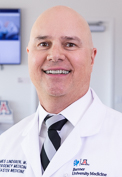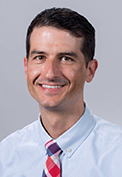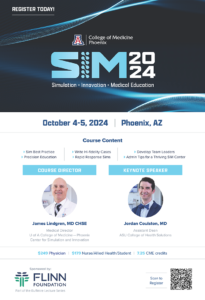
- This event has passed.
SIM 2024: SIMULATION, INNOVATION AND MEDICAL EDUCATION
October 4, 2024 @ 5:00 pm – October 5, 2024 @ 5:00 pm
$249The Center for Simulation and Innovation at the University of Arizona College of Medicine – Phoenix is hosting a conference on simulation best practices. We will cover topics in three different learning tracks — Curricular, Administrative and Action. The conference is open to physicians, nurses, allied health professionals and students with interest in simulation.
Thanks to a generous grant from the Flinn Foundation, attendance is available for a low cost. The conference is also *eligible for 7.25 CME credits. For those attending from out of town, a block of rooms is available at the AC Hotel in Downtown Phoenix. Event registration is opening soon.
*CME is only being applied for Saturday, October 5, for the Plenary and Themed workshop track sessions (info below). A maximum of 7.25 hours of CME credit will be possible if an attendee participates in all sessions.
$249 Physician | $179 Nurse/Allied Health/Student | 7.25 hours of CME credit
Featured Speakers
Course Director

Jim Lindgren, MD, CHSE, FAAP, FACP
Medical Director, Center for Simulation and Innovation, University of Arizona College of Medicine – Phoenix
Keynote Speaker

Jordan Coulston, MD
Asst. Dean, Clinical Education
School of Medicine and Advanced Medical Engineering
Arizona State University | ASU Health
Additional Presenters:
- Kelli Lorentsen, MD, Curricular Co-Director, Center for Simulation and Innovation, College of Medicine – Phoenix.
- Andrew Wong, MD, Associate Professor of Family Medicine, College of Medicine – Phoenix.
- Lorena Navarro, MSHS, RN/BSN, CHSE, Clinical Lead, Center for Simulation and Innovation, College of Medicine – Phoenix.
- Nathan E. Brent, RN, MSN/Ed, CHSE, Senior Program Coordinator, Center for Simulation and Innovation, College of Medicine – Phoenix.
Friday, October 4, Registration and Keynote
Beginning at 5:00 p.m., the conference will hold registration and host a happy hour. Dinner will then take place at 6:00 p.m., and the Keynote Buffmire Lecture — The Future of Simulation: AI & Beyond with Jordan Coulston, MD — will be delivered at 7:00 p.m. The remainder of the evening, 8:00 to 9:00 p.m., will be networking.
Saturday, October 5, Tracks and Sessions
Plenary Session
Best Practices in Simulation, from 8:00 to 8:55 a.m. with Dr. Jim Lindgren
This session will provide an A-Z overview of best practices in simulation. It will review aligning simulation cases and procedures with learning objectives determined by a needs assessment. It will review assessment — including incorporating EPA assessment in undergraduate medical education (UME) and milestones in graduate medical education (GME) simulation activities. It will also provide an overview of the pre-brief and de-briefing processes, as well as best practices for staffing and learner roles.
Curricular
Writing in Hi-Fidelity Simulation Cases, from 9:00 to 9:55 and again at 1:00 to 1:55 p.m. with Dr. Jordan Coulston
This session will provide an overview of how to write a new simulation case scenario for learners following best practices. We will review needs assessments, creating learning objectives, matching content to learner level and creating the case based on those parameters, as well as within resource limitations.
Running Rapid Response Simulations, from 10:00 to 10:55 and again at 2:00 to 2:55 p.m. with Dr. Jordan Coulston
This session will provide an overview of how to run simulations for learners who are part of an on-call team responding to in-hospital urgent/emergent scenarios. It will review the utility of rapid response sims to simulate internship, as well as selecting content and the logistics for carrying out a successful event.
Critical Components: The Pre-Brief and the De-Brief, from 11:00 to 11:55 and again at 3:00 to 3:55 p.m. with Kelli Lorentsen, MD, and Lorena Navarro, RN, CHSE, MSHS
This session will provide an overview of what many consider the most important parts of the simulation experience, the pre-brief and the de-brief. We will describe and analyze the most important content to review, as well as time allotment to ensure success.
Administrative
Simulation Center Administration — Budget, Finance, Personnel, from 9:00 to 9:55 and again at 1:00 to 1:55 p.m. with Dr. Jim Lindgren
This session will provide an overview of administrative aspects of running a center for simulation. It will briefly review physical plant aspects (a separate session dedicated to this topic is provided in another workshop). Budget, finance and personnel aspects will be reviewed — including analysis of the costs to run a successful center. Aspects such as cost per learner hour versus space utilization will help guide those wanting to improve efficiencies or to create a sim center de novo.
Building Simulation Space — Physical Plant and Equipment, from 10:00 to 10:55 and again at 2:00 to 2:55 p.m. with Dr. Jim Lindgren
This session will provide an overview of different types of simulation space. This will include a tour of the University of Arizona Center for Simulation and Innovation to look at inpatient hospital, outpatient clinical, procedure, lecture and debriefing spaces. An overview of both low- and high-fidelity equipment will be presented.
Creative Staffing: A Pooled Staff Model, from 11:00 to 11:55 and again at 3:00 to 3:55 p.m. with Nathan Brent, RN, MSN/Ed, CHSE
This session will provide insight into an alternative staffing approach to minimize cost and maximize efficiency in carrying out simulation activities. Traditional staffing models require FTE at high cost and benefits. An alternate approach to staffing utilizing a pool of workers will be presented along with the strategies to allow successful integration into existing or new simulation centers.
Action
Developing Confident Team Leaders, from 9:00 to 9:55 and again at 1:00 to 1:55 p.m. with Dr. Kelli Lorentsen
This session will discuss the approach to developing learners into confident leaders of code and rapid response teams. We know that early learners struggle with taking on the challenge of orchestrating a team of providers to carry out resuscitation. In this session, we will review a novel program of intentionality that we utilize to augment our BLS/ACLS process to ready learners to be successful team leaders.
Integrating POCUS into Simulation Curriculum, from 10:00 to 10:55 and again at 2:00 to 2:55 p.m. with Dr. Kelli Lorentsen
In this workshop, the elements of a successful POCUS curriculum will be reviewed. We will discuss how to incorporate POCUS into UME starting with Anatomy and expanding into block and clerkship events. Both episodic and more focused content will be reviewed to allow attendees to help determine what may work best for their institution(s).
Crew Resource Management, from 11:00 to 11:55 and again at 3:00 to 3:55 p.m. with Dr. Jordan Coulston
Crew Resource Management (CRM) was originally developed in aviation. It has now become commonplace in health care as a method to train groups to function successfully as teams, as opposed to a collection of individuals. The goal of CRM is to clearly define techniques of communication to prevent errors and to empower everyone on the team to be able to communicate concerns effectively. This session will review CRM in general, and provide tips and tricks to incorporating CRM into training for UME/GME.
Contact
For questions — or to request the detailed agenda, speaker bios and learning objectives for each session — please contact Dr. Jim Lindgren.

